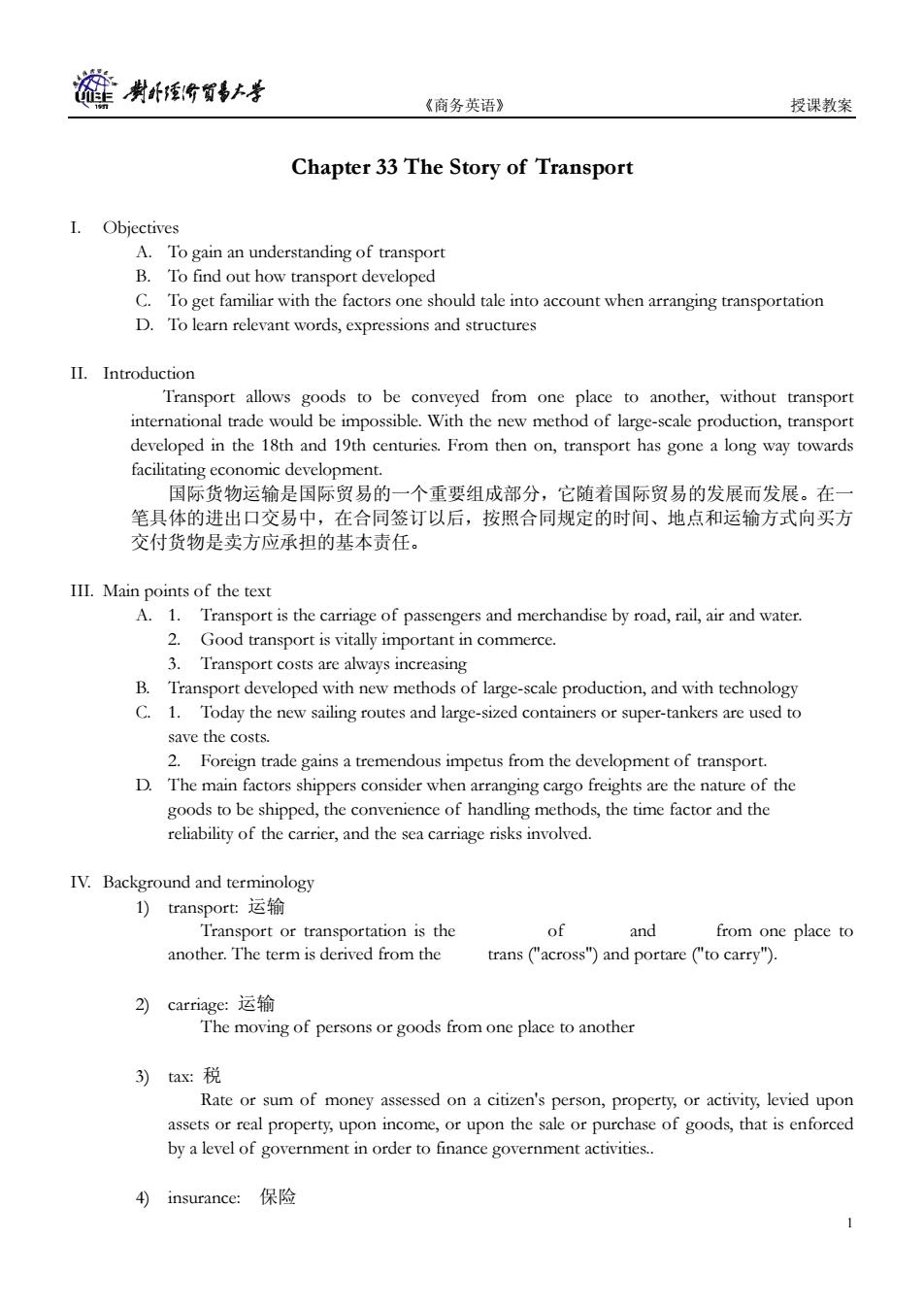
莲肉纤经黄大学 《商务英语》 授课教案 Chapter 33 The Story of Transport I.Objectives A.To gain an understanding of transport B.To find out how transport developed C.To get familiar with the factors one should tale into account when arranging transportation D.To learn relevant words,expressions and structures II.Introduction Transport allows goods to be conveyed from one place to another,without transport international trade would be impossible.With the new method of large-scale production,transport developed in the 18th and 19th centuries.From then on,transport has gone a long way towards facilitating economic development. 国际货物运输是国际贸易的一个重要组成部分,它随着国际贸易的发展而发展。在一 笔具体的进出口交易中,在合同签订以后,按照合同规定的时间、地点和运输方式向买方 交付货物是卖方应承担的基本责任。 III.Main points of the text A.1.Transport is the carriage of passengers and merchandise by road,rail,air and water. 2.Good transport is vitally important in commerce. 3.Transport costs are always increasing B.Transport developed with new methods of large-scale production,and with technology C.1.Today the new sailing routes and large-sized containers or super-tankers are used to save the costs. 2.Foreign trade gains a tremendous impetus from the development of transport. D.The main factors shippers consider when arranging cargo freights are the nature of the goods to be shipped,the convenience of handling methods,the time factor and the reliability of the carrier,and the sea carriage risks involved. IV.Background and terminology 1)transport::运输 Transport or transportation is the of and from one place to another.The term is derived from the trans ("across")and portare ("to carry"). 2)carriage:运输 The moving of persons or goods from one place to another 3)tax:税 Rate or sum of money assessed on a citizen's person,property,or activity,levied upon assets or real property,upon income,or upon the sale or purchase of goods,that is enforced by a level of government in order to finance government activities.. 4)insurance:保险
《商务英语》 授课教案 1 Chapter 33 The Story of Transport I. Objectives A. To gain an understanding of transport B. To find out how transport developed C. To get familiar with the factors one should tale into account when arranging transportation D. To learn relevant words, expressions and structures II. Introduction Transport allows goods to be conveyed from one place to another, without transport international trade would be impossible. With the new method of large-scale production, transport developed in the 18th and 19th centuries. From then on, transport has gone a long way towards facilitating economic development. 国际货物运输是国际贸易的一个重要组成部分,它随着国际贸易的发展而发展。在一 笔具体的进出口交易中,在合同签订以后,按照合同规定的时间、地点和运输方式向买方 交付货物是卖方应承担的基本责任。 III. Main points of the text A. 1. Transport is the carriage of passengers and merchandise by road, rail, air and water. 2. Good transport is vitally important in commerce. 3. Transport costs are always increasing B. Transport developed with new methods of large-scale production, and with technology C. 1. Today the new sailing routes and large-sized containers or super-tankers are used to save the costs. 2. Foreign trade gains a tremendous impetus from the development of transport. D. The main factors shippers consider when arranging cargo freights are the nature of the goods to be shipped, the convenience of handling methods, the time factor and the reliability of the carrier, and the sea carriage risks involved. IV. Background and terminology 1) transport: 运输 Transport or transportation is the movement of people and goods from one place to another. The term is derived from the Latin trans ("across") and portare ("to carry"). 2) carriage: 运输 The moving of persons or goods from one place to another 3) tax: 税 Rate or sum of money assessed on a citizen's person, property, or activity, levied upon assets or real property, upon income, or upon the sale or purchase of goods, that is enforced by a level of government in order to finance government activities.. 4) insurance: 保险
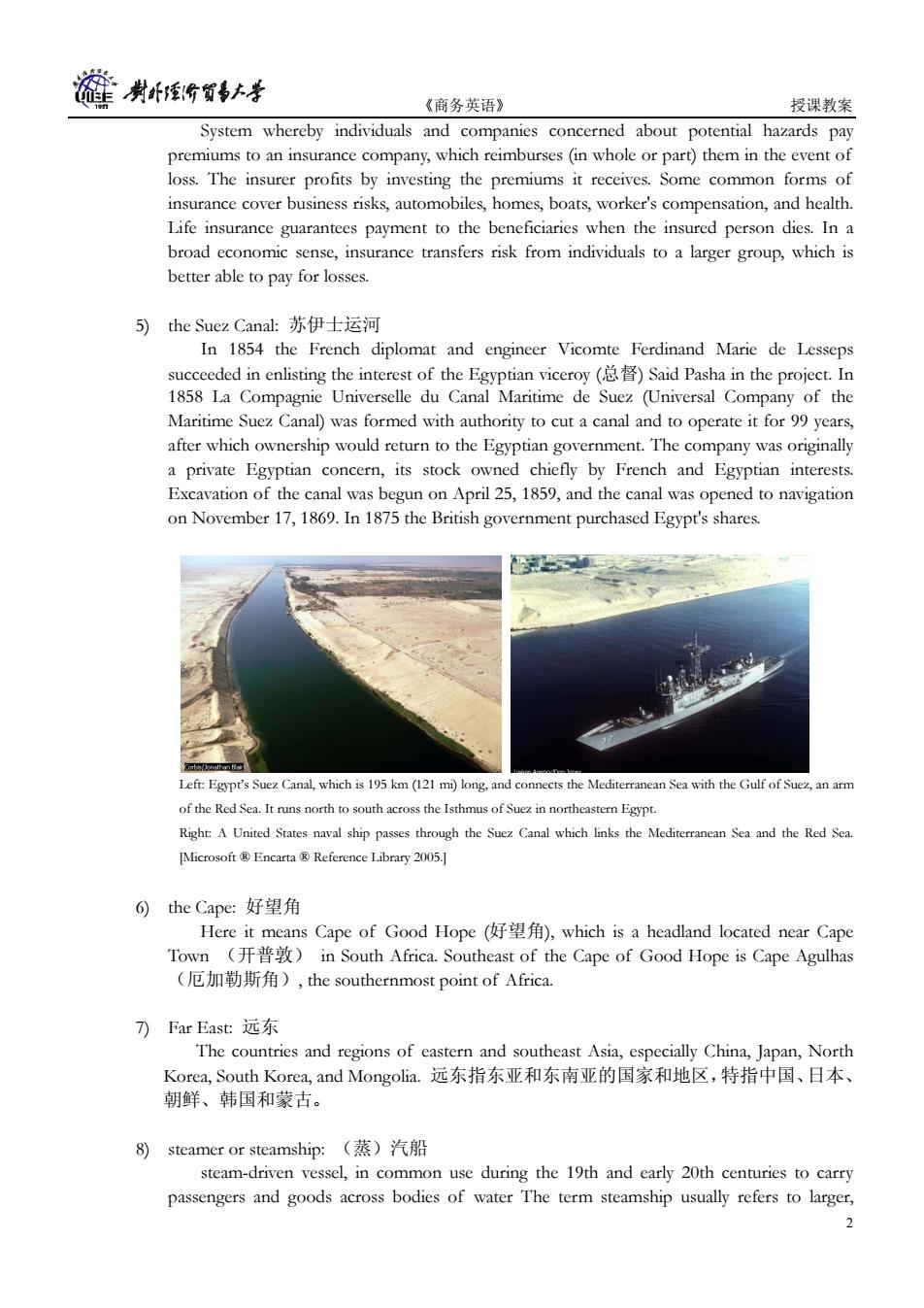
尉纤爱所蜀号大学 《商务英语》 授课教案 System whereby individuals and companies concerned about potential hazards pay premiums to an insurance company,which reimburses (in whole or part)them in the event of loss.The insurer profits by investing the premiums it receives.Some common forms of insurance cover business risks,automobiles,homes,boats,worker's compensation,and health. Life insurance guarantees payment to the beneficiaries when the insured person dies.In a broad economic sense,insurance transfers risk from individuals to a larger group,which is better able to pay for losses. 5)the Suez Canal:苏伊士运河 In 1854 the French diplomat and engineer Vicomte Ferdinand Marie de Lesseps succeeded in enlisting the interest of the Egyptian viceroy (Said Pasha in the project.In 1858 La Compagnie Universelle du Canal Maritime de Suez (Universal Company of the Maritime Suez Canal)was formed with authority to cut a canal and to operate it for 99 years, after which ownership would return to the Egyptian government.The company was originally a private Egyptian concern,its stock owned chiefly by French and Egyptian interests. Excavation of the canal was begun on April 25,1859,and the canal was opened to navigation on November 17,1869.In 1875 the British government purchased Egypt's shares. Left:Egypt's Suez Canal,which is 195 km (121 mi)long,and connects the Mediterranean Sea with the Gulf of Suez,an arm of the Red Sea.It runs north to south across the Isthmus of Suez in northeastern Egypt. Right:A United States naval ship passes through the Suez Canal which links the Mediterranean Sea and the Red Sea. [Microsoft R Encarta R Reference Library 2005.] 6)the Cape:好望角 Here it means Cape of Good Hope(好望角),which is a headland located near Cape Town (in South Africa.Southeast of the Cape of Good Hope is Cape Agulhas (厄加勒斯角),the southernmost point of Africa. 7)Far East::远东 The countries and regions of eastern and southeast Asia,especially China,Japan,North Korea,,South Korea,and Mongolia.远东指东亚和东南亚的国家和地区,特指中国、日本、 朝鲜、韩国和蒙古。 8)steamer or steamship:(蒸)汽船 steam-driven vessel,in common use during the 19th and early 20th centuries to carry passengers and goods across bodies of water The term steamship usually refers to larger, 2
《商务英语》 授课教案 System whereby individuals and companies concerned about potential hazards pay premiums to an insurance company, which reimburses (in whole or part) them in the event of loss. The insurer profits by investing the premiums it receives. Some common forms of insurance cover business risks, automobiles, homes, boats, worker's compensation, and health. Life insurance guarantees payment to the beneficiaries when the insured person dies. In a broad economic sense, insurance transfers risk from individuals to a larger group, which is better able to pay for losses. 5) the Suez Canal: 苏伊士运河 In 1854 the French diplomat and engineer Vicomte Ferdinand Marie de Lesseps succeeded in enlisting the interest of the Egyptian viceroy (总督) Said Pasha in the project. In 1858 La Compagnie Universelle du Canal Maritime de Suez (Universal Company of the Maritime Suez Canal) was formed with authority to cut a canal and to operate it for 99 years, after which ownership would return to the Egyptian government. The company was originally a private Egyptian concern, its stock owned chiefly by French and Egyptian interests. Excavation of the canal was begun on April 25, 1859, and the canal was opened to navigation on November 17, 1869. In 1875 the British government purchased Egypt's shares. Left: Egypt’s Suez Canal, which is 195 km (121 mi) long, and connects the Mediterranean Sea with the Gulf of Suez, an arm of the Red Sea. It runs north to south across the Isthmus of Suez in northeastern Egypt. Right: A United States naval ship passes through the Suez Canal which links the Mediterranean Sea and the Red Sea. [Microsoft ® Encarta ® Reference Library 2005.] 6) the Cape: 好望角 Here it means Cape of Good Hope (好望角), which is a headland located near Cape Town (开普敦) in South Africa. Southeast of the Cape of Good Hope is Cape Agulhas (厄加勒斯角), the southernmost point of Africa. 7) Far East: 远东 The countries and regions of eastern and southeast Asia, especially China, Japan, North Korea, South Korea, and Mongolia. 远东指东亚和东南亚的国家和地区,特指中国、日本、 朝鲜、韩国和蒙古。 8) steamer or steamship: (蒸)汽船 steam-driven vessel, in common use during the 19th and early 20th centuries to carry passengers and goods across bodies of water The term steamship usually refers to larger, 2
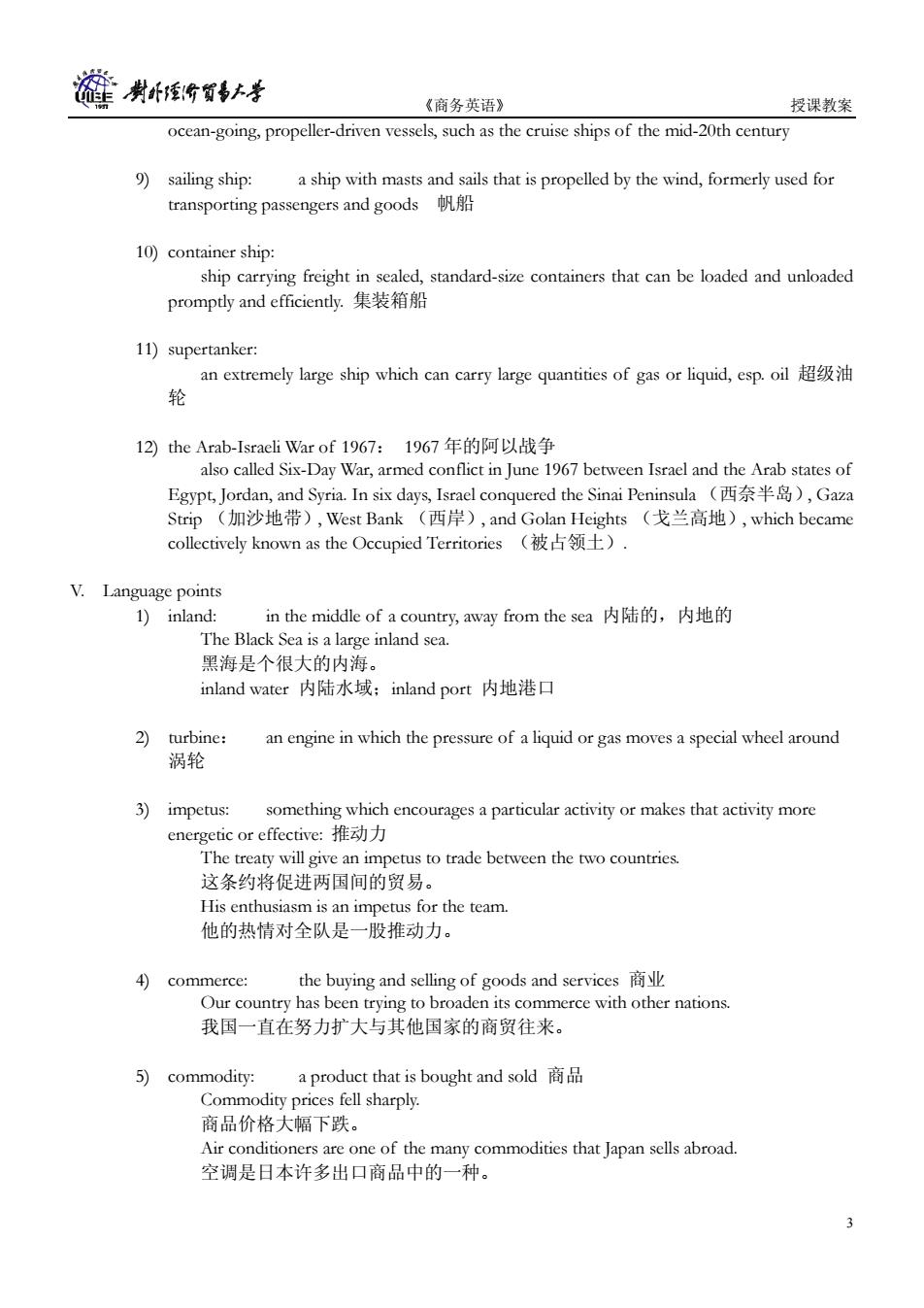
裤尉6黄学 《商务英语》 授课教案 ocean-going,propeller-driven vessels,such as the cruise ships of the mid-20th century 9)sailing ship: a ship with masts and sails that is propelled by the wind,formerly used for transporting passengers and goods帆船 10)container ship: ship carrying freight in sealed,standard-size containers that can be loaded and unloaded promptly and efficiently.集装箱船 11)supertanker: an extremely large ship which can carry large quantities of gas or liquid,esp.oil 轮 12)the Arab-Israeli War of1967:1967年的阿以战争 also called Six-Day War,armed conflict in June 1967 between Israel and the Arab states of Egypt,Jordan,,and Syria.In six days,Israel conquered the Sinai Peninsula(西奈半岛),Gaza Strip(加沙地带),West Bank(西岸),and Golan Heights(戈兰高地),which became collectively known as the Occupied Territories(被占领土). V.Language points 1)inland: in the middle of a country,,away from the sea内陆的,内地的 The Black Sea is a large inland sea. 黑海是个很大的内海。 inland water内陆水域;inland port内地港口 2)turbine: an engine in which the pressure of a liquid or gas moves a special wheel around 涡轮 3)impetus: something which encourages a particular activity or makes that activity more energetic or effective::推动力 The treaty will give an impetus to trade between the two countries. 这条约将促进两国间的贸易。 His enthusiasm is an impetus for the team. 他的热情对全队是一股推动力。 4)commerce: the buying and selling of goods and services商y业 Our country has been trying to broaden its commerce with other nations. 我国一直在努力扩大与其他国家的商贸往来。 5)commodity: a product that is bought and sold商品 Commodity prices fell sharply. 商品价格大幅下跌。 Air conditioners are one of the many commodities that Japan sells abroad. 空调是日本许多出口商品中的一种。 3
《商务英语》 授课教案 3 ocean-going, propeller-driven vessels, such as the cruise ships of the mid-20th century 9) sailing ship: a ship with masts and sails that is propelled by the wind, formerly used for transporting passengers and goods 帆船 10) container ship: ship carrying freight in sealed, standard-size containers that can be loaded and unloaded promptly and efficiently. 集装箱船 11) supertanker: an extremely large ship which can carry large quantities of gas or liquid, esp. oil 超级油 轮 12) the Arab-Israeli War of 1967: 1967 年的阿以战争 also called Six-Day War, armed conflict in June 1967 between Israel and the Arab states of Egypt, Jordan, and Syria. In six days, Israel conquered the Sinai Peninsula (西奈半岛), Gaza Strip (加沙地带), West Bank (西岸), and Golan Heights (戈兰高地), which became collectively known as the Occupied Territories (被占领土). V. Language points 1) inland: in the middle of a country, away from the sea 内陆的,内地的 The Black Sea is a large inland sea. 黑海是个很大的内海。 inland water 内陆水域;inland port 内地港口 2) turbine: an engine in which the pressure of a liquid or gas moves a special wheel around 涡轮 3) impetus: something which encourages a particular activity or makes that activity more energetic or effective: 推动力 The treaty will give an impetus to trade between the two countries. 这条约将促进两国间的贸易。 His enthusiasm is an impetus for the team. 他的热情对全队是一股推动力。 4) commerce: the buying and selling of goods and services 商业 Our country has been trying to broaden its commerce with other nations. 我国一直在努力扩大与其他国家的商贸往来。 5) commodity: a product that is bought and sold 商品 Commodity prices fell sharply. 商品价格大幅下跌。 Air conditioners are one of the many commodities that Japan sells abroad. 空调是日本许多出口商品中的一种
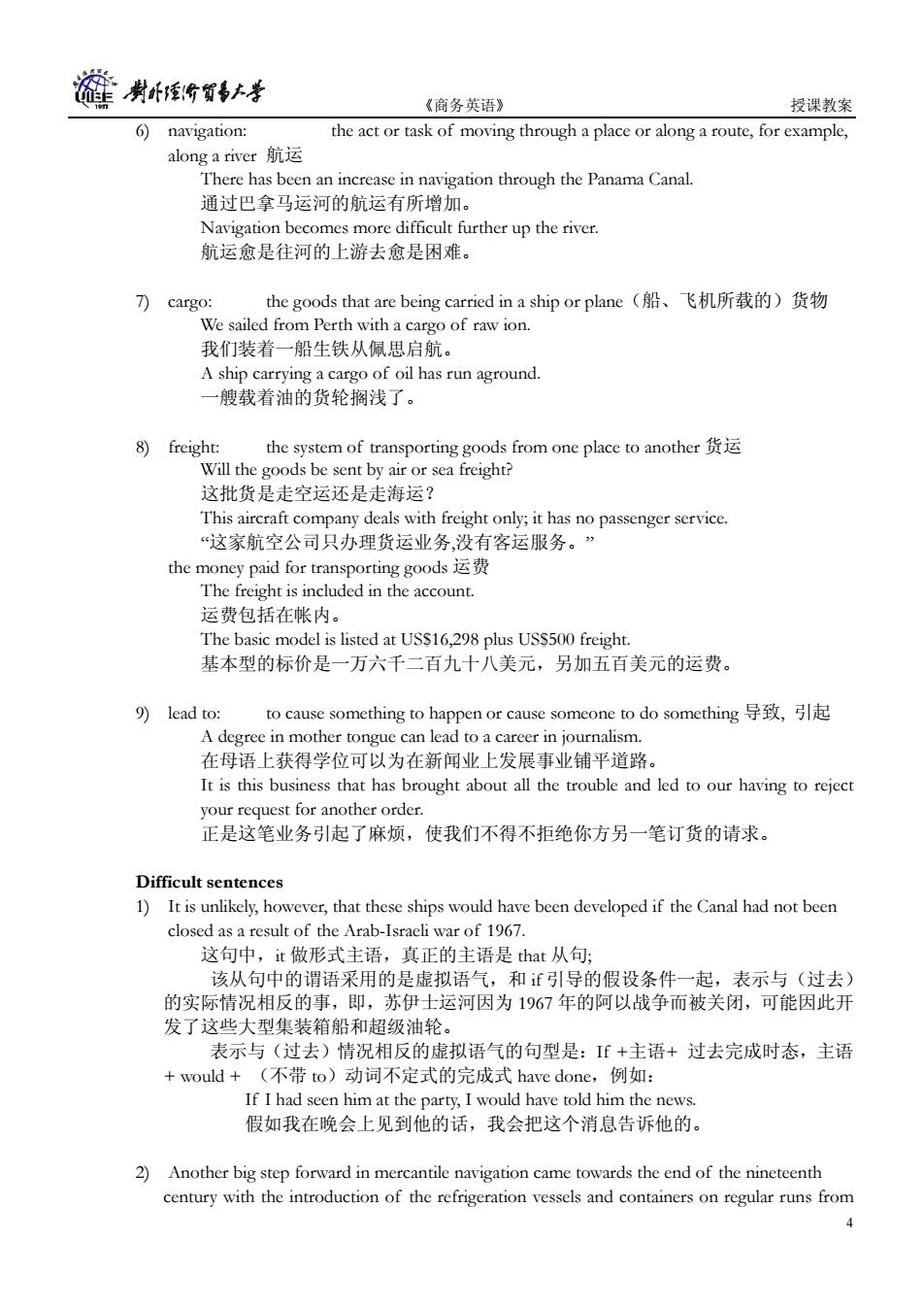
岗仟经所蜀号大学 《商务英语》 授课教案 6)navigation: the act or task of moving through a place or along a route,for example, along a river航运 There has been an increase in navigation through the Panama Canal. 通过巴拿马运河的航运有所增加。 Navigation becomes more difficult further up the river. 航运愈是往河的上游去愈是困难。 7 cargo: the goods that are being carried in a ship or plane(船、飞机所载的)货物 We sailed from Perth with a cargo of raw ion. 我们装着一船生铁从佩思启航。 A ship carrying a cargo of oil has run aground. 一艘载着油的货轮搁浅了。 8)freight: the system of transporting goods from one place to another Will the goods be sent by air or sea freight? 这批货是走空运还是走海运? This aircraft company deals with freight only;it has no passenger service. 这家航空公司只办理货运业务,没有客运服务。” the money paid for transporting goods运费 The freight is included in the account. 运费包括在帐内。 The basic model is listed at USS16,298 plus USS500 freight 基本型的标价是一万六千二百九十八美元,另加五百美元的运费。 9)lead to: to cause something to happen or cause someone to do something导s致,引起 A degree in mother tongue can lead to a career in journalism. 在母语上获得学位可以为在新闻业上发展事业铺平道路。 It is this business that has brought about all the trouble and led to our having to reject your request for another order. 正是这笔业务引起了麻烦,使我们不得不拒绝你方另一笔订货的请求。 Difficult sentences 1)It is unlikely,however,that these ships would have been developed if the Canal had not been closed as a result of the Arab-Israeli war of 1967. 这句中,it做形式主语,真正的主语是hat从句; 该从句中的谓语采用的是虚拟语气,和f引导的假设条件一起,表示与(过去) 的实际情况相反的事,即,苏伊士运河因为1967年的阿以战争而被关闭,可能因此开 发了这些大型集装箱船和超级油轮。 表示与(过去)情况相反的虚拟语气的句型是:If+主语+过去完成时态,主语 +would+(不带to)动词不定式的完成式have done,例如: If I had seen him at the party,I would have told him the news. 假如我在晚会上见到他的话,我会把这个消息告诉他的。 2)Another big step forward in mercantile navigation came towards the end of the nineteenth century with the introduction of the refrigeration vessels and containers on regular runs from 4
《商务英语》 授课教案 4 6) navigation: the act or task of moving through a place or along a route, for example, along a river 航运 There has been an increase in navigation through the Panama Canal. 通过巴拿马运河的航运有所增加。 Navigation becomes more difficult further up the river. 航运愈是往河的上游去愈是困难。 7) cargo: the goods that are being carried in a ship or plane(船、飞机所载的)货物 We sailed from Perth with a cargo of raw ion. 我们装着一船生铁从佩思启航。 A ship carrying a cargo of oil has run aground. 一艘载着油的货轮搁浅了。 8) freight: the system of transporting goods from one place to another 货运 Will the goods be sent by air or sea freight? 这批货是走空运还是走海运? This aircraft company deals with freight only; it has no passenger service. “这家航空公司只办理货运业务,没有客运服务。” the money paid for transporting goods 运费 The freight is included in the account. 运费包括在帐内。 The basic model is listed at US$16,298 plus US$500 freight. 基本型的标价是一万六千二百九十八美元,另加五百美元的运费。 9) lead to: to cause something to happen or cause someone to do something 导致, 引起 A degree in mother tongue can lead to a career in journalism. 在母语上获得学位可以为在新闻业上发展事业铺平道路。 It is this business that has brought about all the trouble and led to our having to reject your request for another order. 正是这笔业务引起了麻烦,使我们不得不拒绝你方另一笔订货的请求。 Difficult sentences 1) It is unlikely, however, that these ships would have been developed if the Canal had not been closed as a result of the Arab-Israeli war of 1967. 这句中,it 做形式主语,真正的主语是 that 从句; 该从句中的谓语采用的是虚拟语气,和 if 引导的假设条件一起,表示与(过去) 的实际情况相反的事,即,苏伊士运河因为 1967 年的阿以战争而被关闭,可能因此开 发了这些大型集装箱船和超级油轮。 表示与(过去)情况相反的虚拟语气的句型是:If +主语+ 过去完成时态,主语 + would + (不带 to)动词不定式的完成式 have done,例如: If I had seen him at the party, I would have told him the news. 假如我在晚会上见到他的话,我会把这个消息告诉他的。 2) Another big step forward in mercantile navigation came towards the end of the nineteenth century with the introduction of the refrigeration vessels and containers on regular runs from
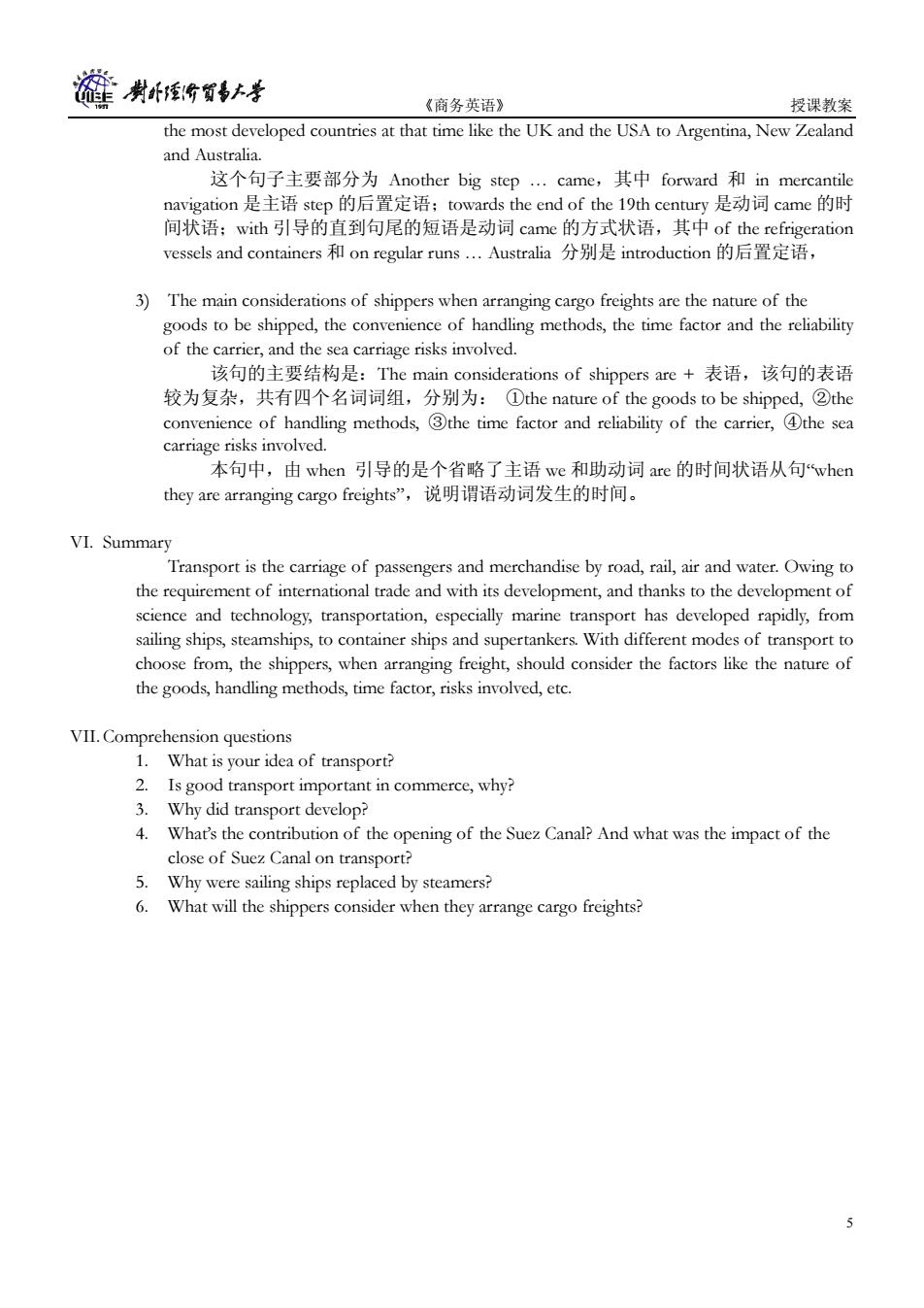
莲肉纤黄大学 《商务英语》 授课教案 the most developed countries at that time like the UK and the USA to Argentina,New Zealand and Australia. 这个句子主要部分为Another big step..came,其中forward和in mercantile navigation是主语step的后置定语;towards the end of the 19 th century是动词came的时 间状语:with引导的直到句尾的短语是动词came的方式状语,其中of the refrigeration vessels and containers和on regular runs..Australia分别是introduction的后置定语, 3)The main considerations of shippers when arranging cargo freights are the nature of the goods to be shipped,the convenience of handling methods,the time factor and the reliability of the carrier,and the sea carriage risks involved. 该句的主要结构是:The main considerations of shippers are+表语,该句的表语 较为复杂,共有四个名词词组,分别为:①the nature of the goods to be shipped,②the convenience of handling methods,3the time factor and reliability of the carrier,4the sea carriage risks involved. 本句中,由when引导的是个省略了主语we和助动词are的时间状语从句when they are arranging cargo freights'”,说明谓语动词发生的时间。 VI.Summary Transport is the carriage of passengers and merchandise by road,rail,air and water.Owing to the requirement of international trade and with its development,and thanks to the development of science and technology,transportation,especially marine transport has developed rapidly,from sailing ships,steamships,to container ships and supertankers.With different modes of transport to choose from,the shippers,when arranging freight,should consider the factors like the nature of the goods,handling methods,time factor,risks involved,etc. VII.Comprehension questions 1.What is your idea of transport? 2.Is good transport important in commerce,why? 3.Why did transport develop? 4. What's the contribution of the opening of the Suez Canal?And what was the impact of the close of Suez Canal on transport? 5.Why were sailing ships replaced by steamers? 6.What will the shippers consider when they arrange cargo freights?
《商务英语》 授课教案 5 the most developed countries at that time like the UK and the USA to Argentina, New Zealand and Australia. 这个句子主要部分为 Another big step … came,其中 forward 和 in mercantile navigation 是主语 step 的后置定语;towards the end of the 19th century 是动词 came 的时 间状语;with 引导的直到句尾的短语是动词 came 的方式状语,其中 of the refrigeration vessels and containers 和 on regular runs … Australia 分别是 introduction 的后置定语, 3) The main considerations of shippers when arranging cargo freights are the nature of the goods to be shipped, the convenience of handling methods, the time factor and the reliability of the carrier, and the sea carriage risks involved. 该句的主要结构是:The main considerations of shippers are + 表语,该句的表语 较为复杂,共有四个名词词组,分别为: ①the nature of the goods to be shipped, ②the convenience of handling methods, ③the time factor and reliability of the carrier, ④the sea carriage risks involved. 本句中,由 when 引导的是个省略了主语 we 和助动词 are 的时间状语从句“when they are arranging cargo freights”,说明谓语动词发生的时间。 VI. Summary Transport is the carriage of passengers and merchandise by road, rail, air and water. Owing to the requirement of international trade and with its development, and thanks to the development of science and technology, transportation, especially marine transport has developed rapidly, from sailing ships, steamships, to container ships and supertankers. With different modes of transport to choose from, the shippers, when arranging freight, should consider the factors like the nature of the goods, handling methods, time factor, risks involved, etc. VII. Comprehension questions 1. What is your idea of transport? 2. Is good transport important in commerce, why? 3. Why did transport develop? 4. What’s the contribution of the opening of the Suez Canal? And what was the impact of the close of Suez Canal on transport? 5. Why were sailing ships replaced by steamers? 6. What will the shippers consider when they arrange cargo freights?